Factors Affecting Humanitarian Supply Chain Performance: A Review
VerifiedAdded on 2023/01/23
|12
|3681
|49
Report
AI Summary
This report provides a comprehensive literature review examining the factors that influence humanitarian supply chain performance. The study delves into the impact of political situations, socio-economic factors, internal organizational aspects, and infrastructure on the efficiency of humanitarian logistics. It analyzes how political instability, government policies, and corruption can hinder operations, while also considering the role of socio-economic conditions like employment and education in shaping the availability of skilled personnel. The report further investigates the effects of internal organizational issues, such as lack of recognition, technology, and funding, on the overall performance. Additionally, it assesses how infrastructure limitations, including poor road conditions and inadequate facilities, affect the ability of humanitarian teams to respond effectively to crises. The review draws on various research papers to provide a detailed analysis of the challenges faced by humanitarian logistics and offers insights into potential areas for improvement.
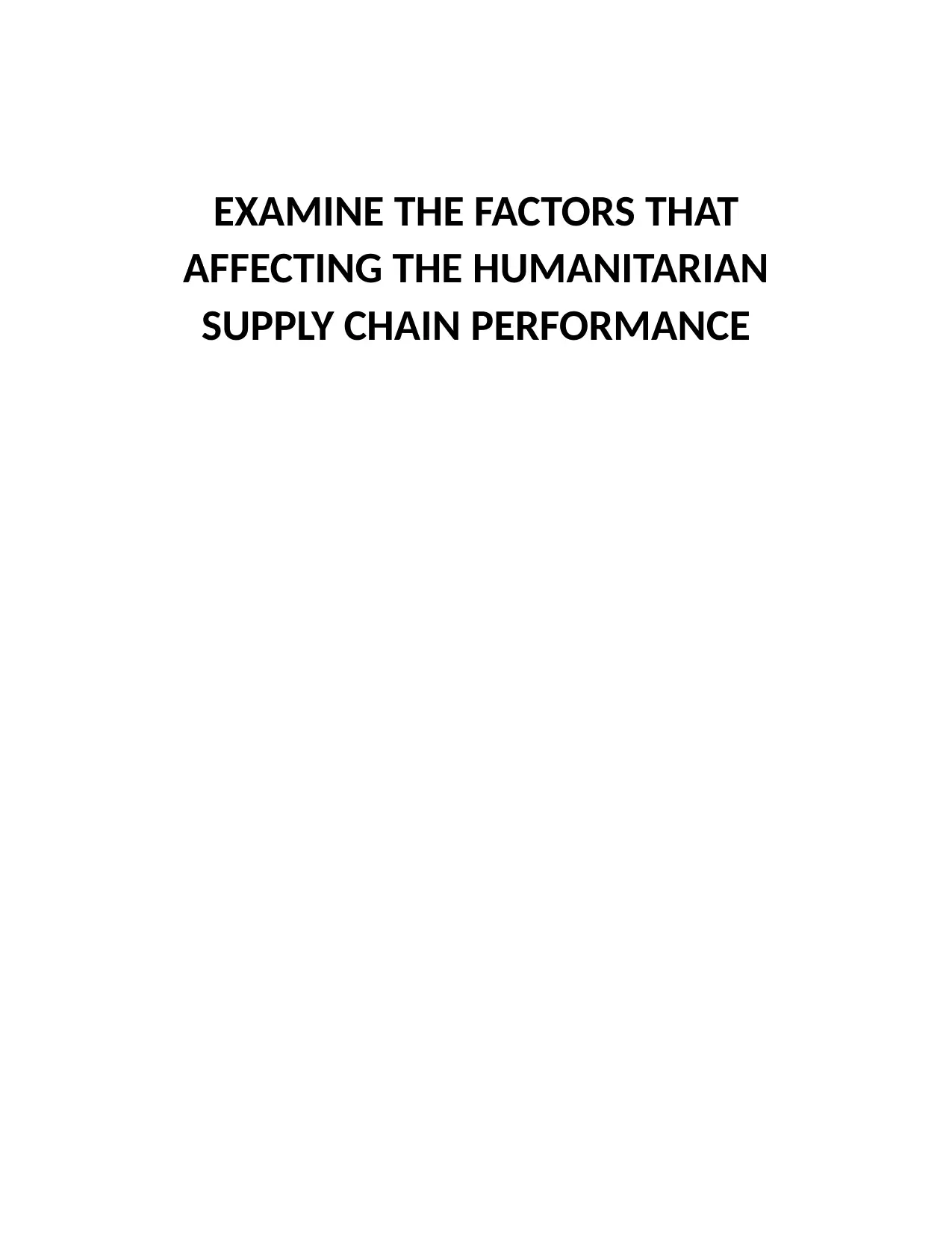
EXAMINE THE FACTORS THAT
AFFECTING THE HUMANITARIAN
SUPPLY CHAIN PERFORMANCE
AFFECTING THE HUMANITARIAN
SUPPLY CHAIN PERFORMANCE
Paraphrase This Document
Need a fresh take? Get an instant paraphrase of this document with our AI Paraphraser
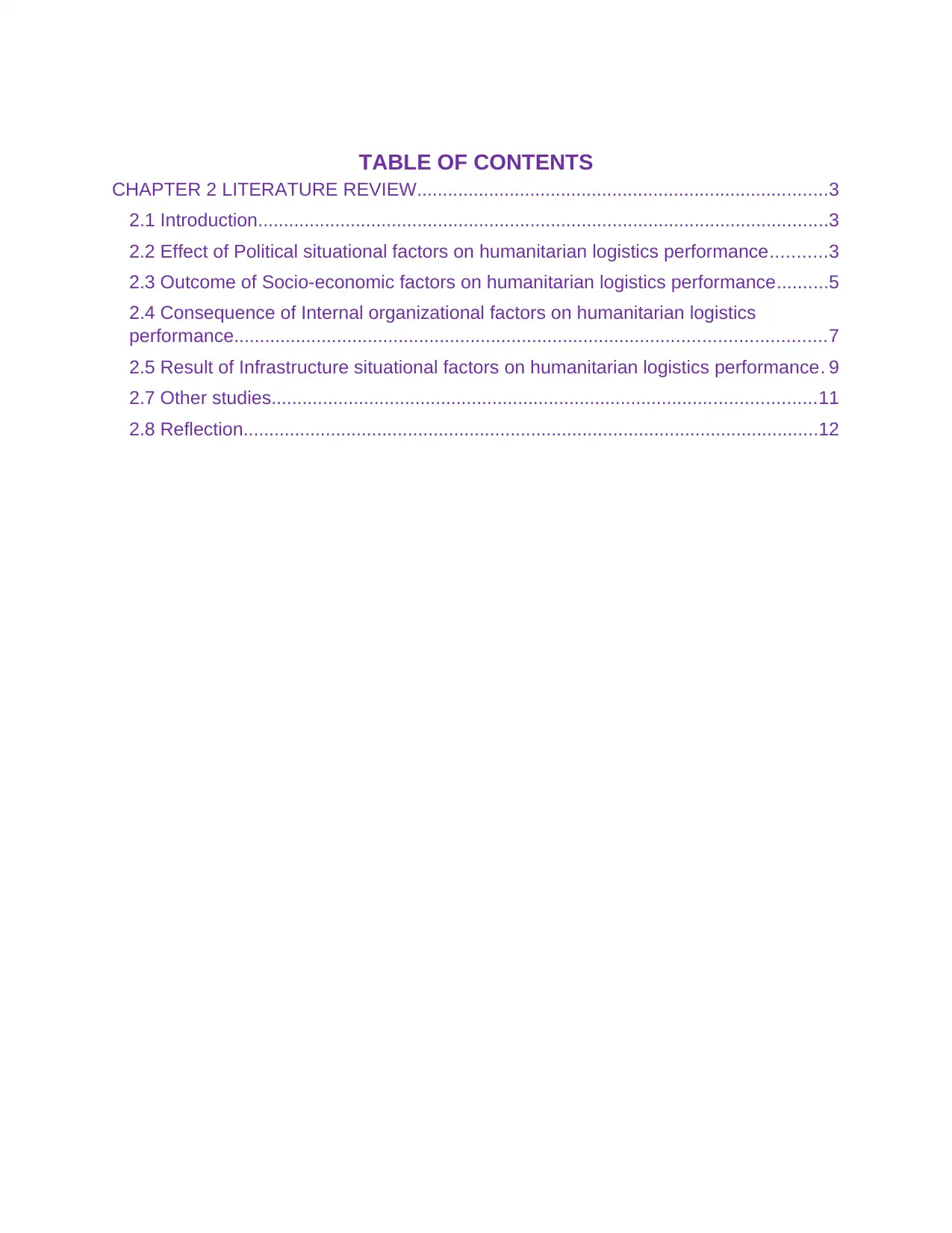
TABLE OF CONTENTS
CHAPTER 2 LITERATURE REVIEW................................................................................3
2.1 Introduction...............................................................................................................3
2.2 Effect of Political situational factors on humanitarian logistics performance...........3
2.3 Outcome of Socio-economic factors on humanitarian logistics performance..........5
2.4 Consequence of Internal organizational factors on humanitarian logistics
performance...................................................................................................................7
2.5 Result of Infrastructure situational factors on humanitarian logistics performance. 9
2.7 Other studies..........................................................................................................11
2.8 Reflection................................................................................................................12
CHAPTER 2 LITERATURE REVIEW................................................................................3
2.1 Introduction...............................................................................................................3
2.2 Effect of Political situational factors on humanitarian logistics performance...........3
2.3 Outcome of Socio-economic factors on humanitarian logistics performance..........5
2.4 Consequence of Internal organizational factors on humanitarian logistics
performance...................................................................................................................7
2.5 Result of Infrastructure situational factors on humanitarian logistics performance. 9
2.7 Other studies..........................................................................................................11
2.8 Reflection................................................................................................................12
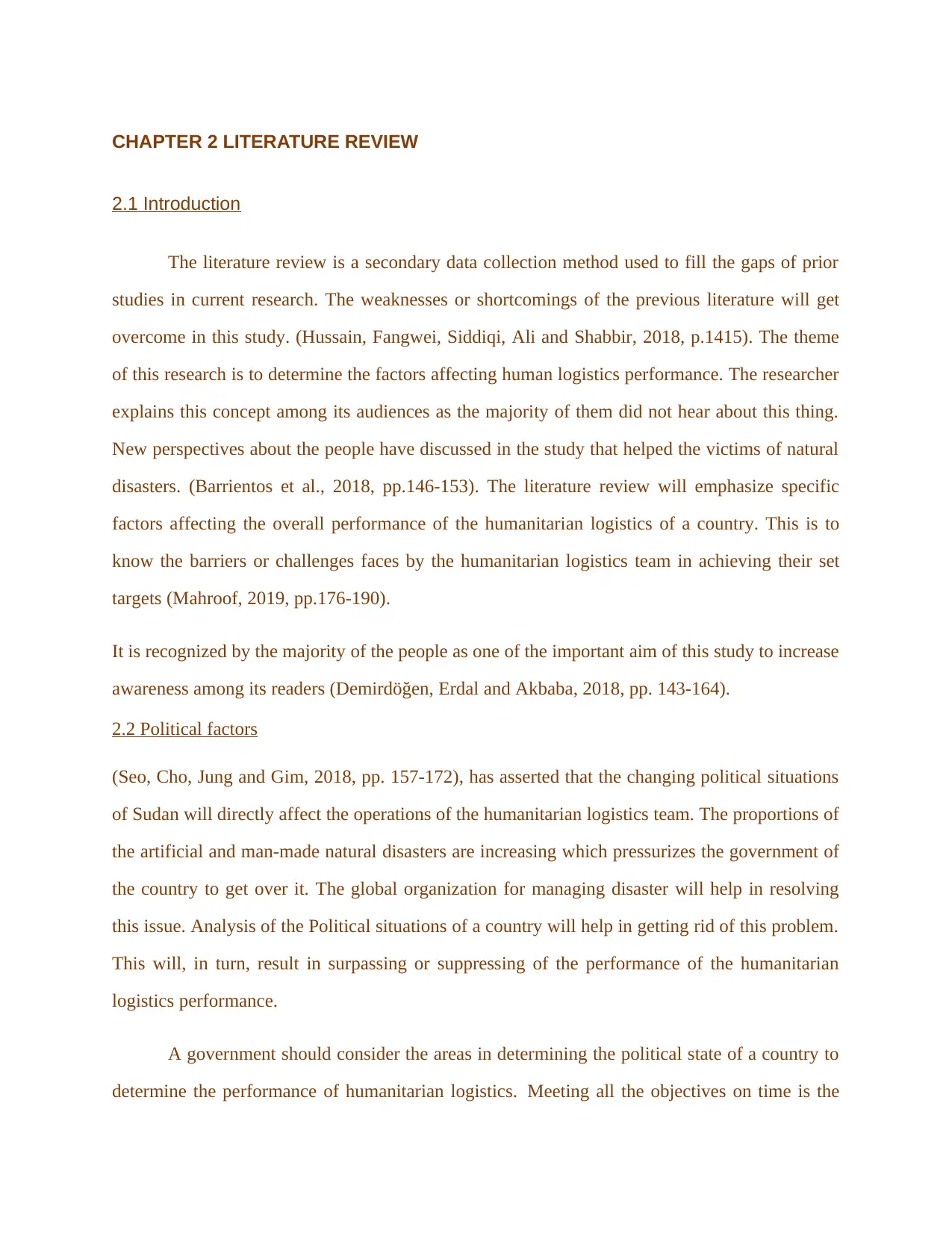
CHAPTER 2 LITERATURE REVIEW
2.1 Introduction
The literature review is a secondary data collection method used to fill the gaps of prior
studies in current research. The weaknesses or shortcomings of the previous literature will get
overcome in this study. (Hussain, Fangwei, Siddiqi, Ali and Shabbir, 2018, p.1415). The theme
of this research is to determine the factors affecting human logistics performance. The researcher
explains this concept among its audiences as the majority of them did not hear about this thing.
New perspectives about the people have discussed in the study that helped the victims of natural
disasters. (Barrientos et al., 2018, pp.146-153). The literature review will emphasize specific
factors affecting the overall performance of the humanitarian logistics of a country. This is to
know the barriers or challenges faces by the humanitarian logistics team in achieving their set
targets (Mahroof, 2019, pp.176-190).
It is recognized by the majority of the people as one of the important aim of this study to increase
awareness among its readers (Demirdöğen, Erdal and Akbaba, 2018, pp. 143-164).
2.2 Political factors
(Seo, Cho, Jung and Gim, 2018, pp. 157-172), has asserted that the changing political situations
of Sudan will directly affect the operations of the humanitarian logistics team. The proportions of
the artificial and man-made natural disasters are increasing which pressurizes the government of
the country to get over it. The global organization for managing disaster will help in resolving
this issue. Analysis of the Political situations of a country will help in getting rid of this problem.
This will, in turn, result in surpassing or suppressing of the performance of the humanitarian
logistics performance.
A government should consider the areas in determining the political state of a country to
determine the performance of humanitarian logistics. Meeting all the objectives on time is the
2.1 Introduction
The literature review is a secondary data collection method used to fill the gaps of prior
studies in current research. The weaknesses or shortcomings of the previous literature will get
overcome in this study. (Hussain, Fangwei, Siddiqi, Ali and Shabbir, 2018, p.1415). The theme
of this research is to determine the factors affecting human logistics performance. The researcher
explains this concept among its audiences as the majority of them did not hear about this thing.
New perspectives about the people have discussed in the study that helped the victims of natural
disasters. (Barrientos et al., 2018, pp.146-153). The literature review will emphasize specific
factors affecting the overall performance of the humanitarian logistics of a country. This is to
know the barriers or challenges faces by the humanitarian logistics team in achieving their set
targets (Mahroof, 2019, pp.176-190).
It is recognized by the majority of the people as one of the important aim of this study to increase
awareness among its readers (Demirdöğen, Erdal and Akbaba, 2018, pp. 143-164).
2.2 Political factors
(Seo, Cho, Jung and Gim, 2018, pp. 157-172), has asserted that the changing political situations
of Sudan will directly affect the operations of the humanitarian logistics team. The proportions of
the artificial and man-made natural disasters are increasing which pressurizes the government of
the country to get over it. The global organization for managing disaster will help in resolving
this issue. Analysis of the Political situations of a country will help in getting rid of this problem.
This will, in turn, result in surpassing or suppressing of the performance of the humanitarian
logistics performance.
A government should consider the areas in determining the political state of a country to
determine the performance of humanitarian logistics. Meeting all the objectives on time is the
⊘ This is a preview!⊘
Do you want full access?
Subscribe today to unlock all pages.

Trusted by 1+ million students worldwide
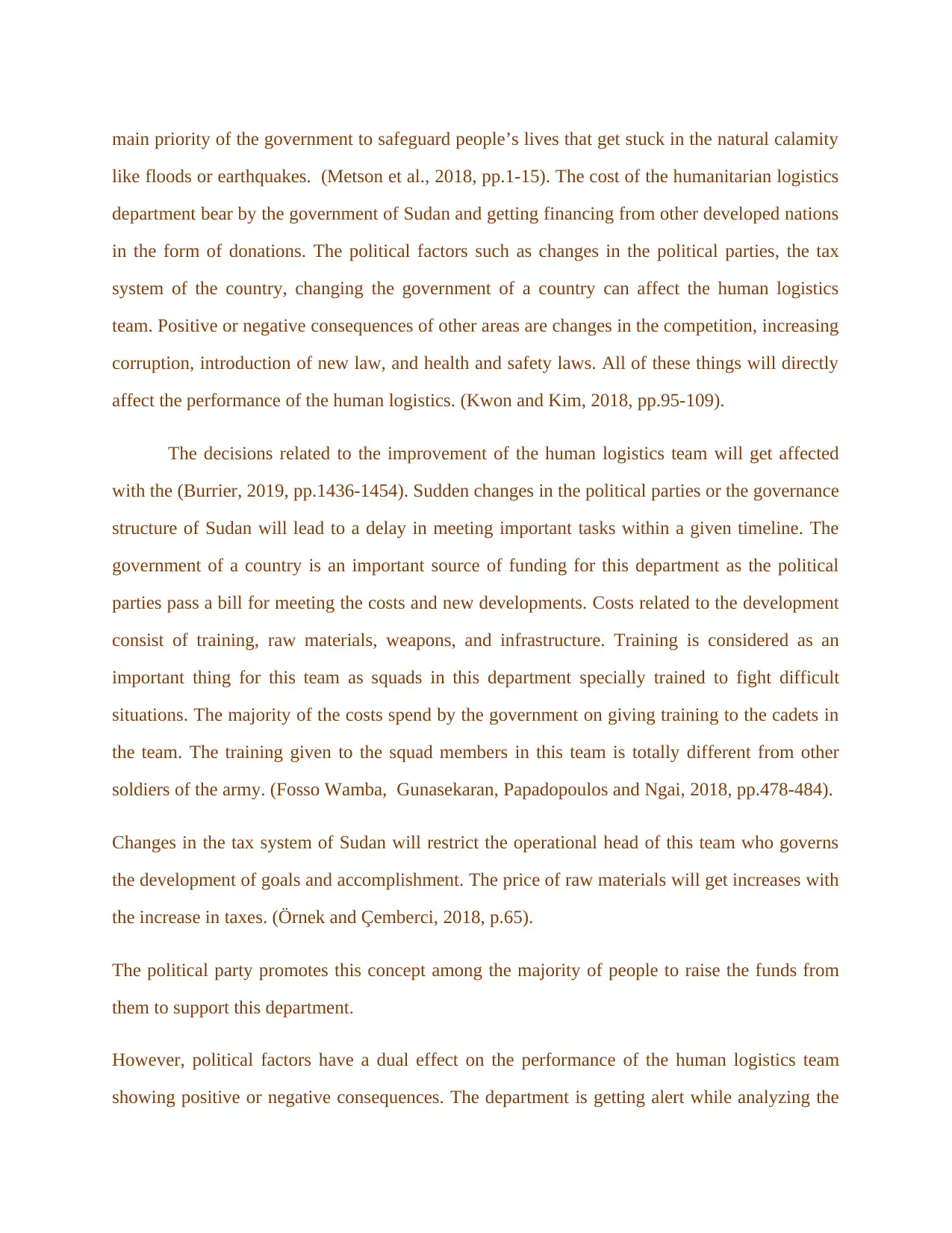
main priority of the government to safeguard people’s lives that get stuck in the natural calamity
like floods or earthquakes. (Metson et al., 2018, pp.1-15). The cost of the humanitarian logistics
department bear by the government of Sudan and getting financing from other developed nations
in the form of donations. The political factors such as changes in the political parties, the tax
system of the country, changing the government of a country can affect the human logistics
team. Positive or negative consequences of other areas are changes in the competition, increasing
corruption, introduction of new law, and health and safety laws. All of these things will directly
affect the performance of the human logistics. (Kwon and Kim, 2018, pp.95-109).
The decisions related to the improvement of the human logistics team will get affected
with the (Burrier, 2019, pp.1436-1454). Sudden changes in the political parties or the governance
structure of Sudan will lead to a delay in meeting important tasks within a given timeline. The
government of a country is an important source of funding for this department as the political
parties pass a bill for meeting the costs and new developments. Costs related to the development
consist of training, raw materials, weapons, and infrastructure. Training is considered as an
important thing for this team as squads in this department specially trained to fight difficult
situations. The majority of the costs spend by the government on giving training to the cadets in
the team. The training given to the squad members in this team is totally different from other
soldiers of the army. (Fosso Wamba, Gunasekaran, Papadopoulos and Ngai, 2018, pp.478-484).
Changes in the tax system of Sudan will restrict the operational head of this team who governs
the development of goals and accomplishment. The price of raw materials will get increases with
the increase in taxes. (Örnek and Çemberci, 2018, p.65).
The political party promotes this concept among the majority of people to raise the funds from
them to support this department.
However, political factors have a dual effect on the performance of the human logistics team
showing positive or negative consequences. The department is getting alert while analyzing the
like floods or earthquakes. (Metson et al., 2018, pp.1-15). The cost of the humanitarian logistics
department bear by the government of Sudan and getting financing from other developed nations
in the form of donations. The political factors such as changes in the political parties, the tax
system of the country, changing the government of a country can affect the human logistics
team. Positive or negative consequences of other areas are changes in the competition, increasing
corruption, introduction of new law, and health and safety laws. All of these things will directly
affect the performance of the human logistics. (Kwon and Kim, 2018, pp.95-109).
The decisions related to the improvement of the human logistics team will get affected
with the (Burrier, 2019, pp.1436-1454). Sudden changes in the political parties or the governance
structure of Sudan will lead to a delay in meeting important tasks within a given timeline. The
government of a country is an important source of funding for this department as the political
parties pass a bill for meeting the costs and new developments. Costs related to the development
consist of training, raw materials, weapons, and infrastructure. Training is considered as an
important thing for this team as squads in this department specially trained to fight difficult
situations. The majority of the costs spend by the government on giving training to the cadets in
the team. The training given to the squad members in this team is totally different from other
soldiers of the army. (Fosso Wamba, Gunasekaran, Papadopoulos and Ngai, 2018, pp.478-484).
Changes in the tax system of Sudan will restrict the operational head of this team who governs
the development of goals and accomplishment. The price of raw materials will get increases with
the increase in taxes. (Örnek and Çemberci, 2018, p.65).
The political party promotes this concept among the majority of people to raise the funds from
them to support this department.
However, political factors have a dual effect on the performance of the human logistics team
showing positive or negative consequences. The department is getting alert while analyzing the
Paraphrase This Document
Need a fresh take? Get an instant paraphrase of this document with our AI Paraphraser
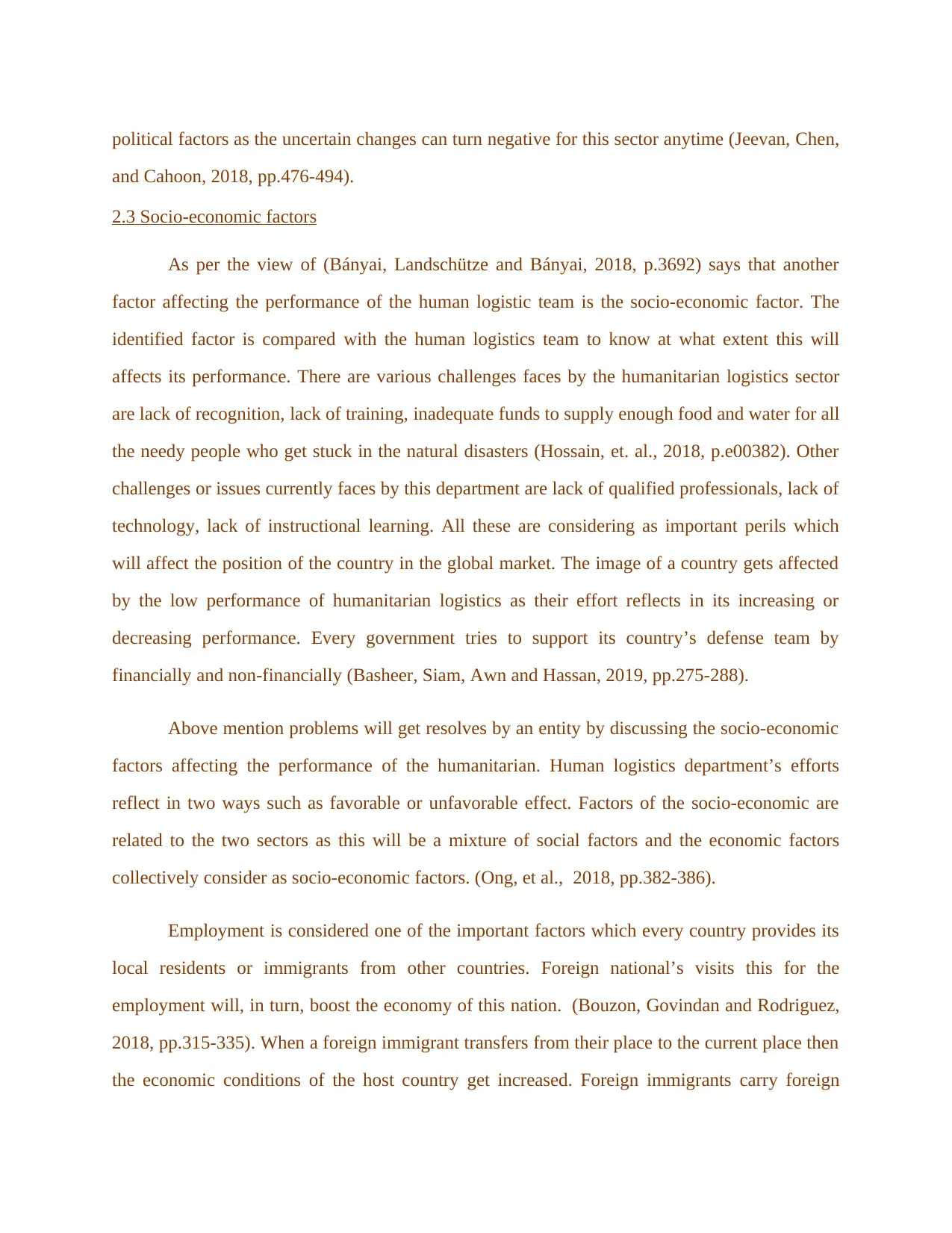
political factors as the uncertain changes can turn negative for this sector anytime (Jeevan, Chen,
and Cahoon, 2018, pp.476-494).
2.3 Socio-economic factors
As per the view of (Bányai, Landschütze and Bányai, 2018, p.3692) says that another
factor affecting the performance of the human logistic team is the socio-economic factor. The
identified factor is compared with the human logistics team to know at what extent this will
affects its performance. There are various challenges faces by the humanitarian logistics sector
are lack of recognition, lack of training, inadequate funds to supply enough food and water for all
the needy people who get stuck in the natural disasters (Hossain, et. al., 2018, p.e00382). Other
challenges or issues currently faces by this department are lack of qualified professionals, lack of
technology, lack of instructional learning. All these are considering as important perils which
will affect the position of the country in the global market. The image of a country gets affected
by the low performance of humanitarian logistics as their effort reflects in its increasing or
decreasing performance. Every government tries to support its country’s defense team by
financially and non-financially (Basheer, Siam, Awn and Hassan, 2019, pp.275-288).
Above mention problems will get resolves by an entity by discussing the socio-economic
factors affecting the performance of the humanitarian. Human logistics department’s efforts
reflect in two ways such as favorable or unfavorable effect. Factors of the socio-economic are
related to the two sectors as this will be a mixture of social factors and the economic factors
collectively consider as socio-economic factors. (Ong, et al., 2018, pp.382-386).
Employment is considered one of the important factors which every country provides its
local residents or immigrants from other countries. Foreign national’s visits this for the
employment will, in turn, boost the economy of this nation. (Bouzon, Govindan and Rodriguez,
2018, pp.315-335). When a foreign immigrant transfers from their place to the current place then
the economic conditions of the host country get increased. Foreign immigrants carry foreign
and Cahoon, 2018, pp.476-494).
2.3 Socio-economic factors
As per the view of (Bányai, Landschütze and Bányai, 2018, p.3692) says that another
factor affecting the performance of the human logistic team is the socio-economic factor. The
identified factor is compared with the human logistics team to know at what extent this will
affects its performance. There are various challenges faces by the humanitarian logistics sector
are lack of recognition, lack of training, inadequate funds to supply enough food and water for all
the needy people who get stuck in the natural disasters (Hossain, et. al., 2018, p.e00382). Other
challenges or issues currently faces by this department are lack of qualified professionals, lack of
technology, lack of instructional learning. All these are considering as important perils which
will affect the position of the country in the global market. The image of a country gets affected
by the low performance of humanitarian logistics as their effort reflects in its increasing or
decreasing performance. Every government tries to support its country’s defense team by
financially and non-financially (Basheer, Siam, Awn and Hassan, 2019, pp.275-288).
Above mention problems will get resolves by an entity by discussing the socio-economic
factors affecting the performance of the humanitarian. Human logistics department’s efforts
reflect in two ways such as favorable or unfavorable effect. Factors of the socio-economic are
related to the two sectors as this will be a mixture of social factors and the economic factors
collectively consider as socio-economic factors. (Ong, et al., 2018, pp.382-386).
Employment is considered one of the important factors which every country provides its
local residents or immigrants from other countries. Foreign national’s visits this for the
employment will, in turn, boost the economy of this nation. (Bouzon, Govindan and Rodriguez,
2018, pp.315-335). When a foreign immigrant transfers from their place to the current place then
the economic conditions of the host country get increased. Foreign immigrants carry foreign
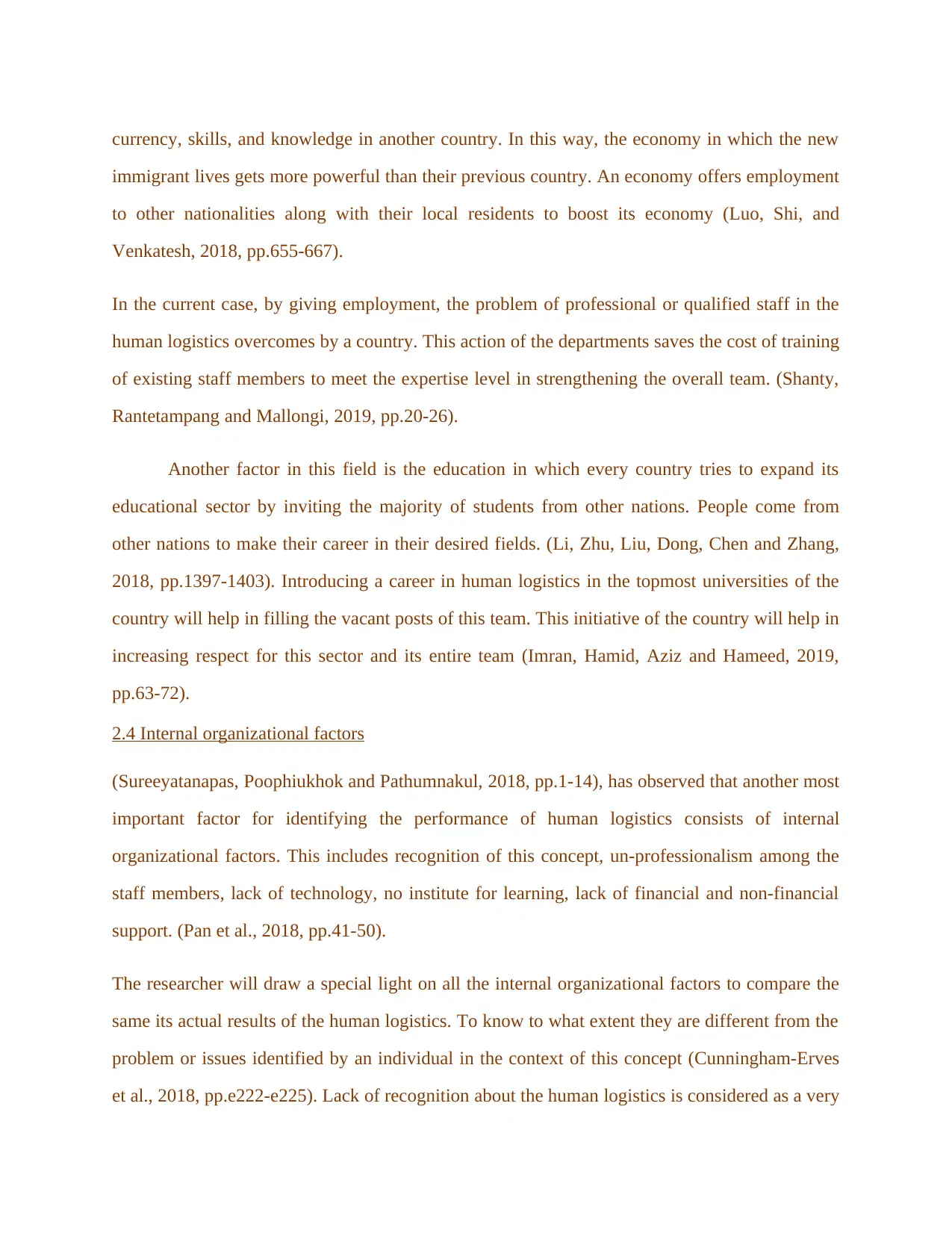
currency, skills, and knowledge in another country. In this way, the economy in which the new
immigrant lives gets more powerful than their previous country. An economy offers employment
to other nationalities along with their local residents to boost its economy (Luo, Shi, and
Venkatesh, 2018, pp.655-667).
In the current case, by giving employment, the problem of professional or qualified staff in the
human logistics overcomes by a country. This action of the departments saves the cost of training
of existing staff members to meet the expertise level in strengthening the overall team. (Shanty,
Rantetampang and Mallongi, 2019, pp.20-26).
Another factor in this field is the education in which every country tries to expand its
educational sector by inviting the majority of students from other nations. People come from
other nations to make their career in their desired fields. (Li, Zhu, Liu, Dong, Chen and Zhang,
2018, pp.1397-1403). Introducing a career in human logistics in the topmost universities of the
country will help in filling the vacant posts of this team. This initiative of the country will help in
increasing respect for this sector and its entire team (Imran, Hamid, Aziz and Hameed, 2019,
pp.63-72).
2.4 Internal organizational factors
(Sureeyatanapas, Poophiukhok and Pathumnakul, 2018, pp.1-14), has observed that another most
important factor for identifying the performance of human logistics consists of internal
organizational factors. This includes recognition of this concept, un-professionalism among the
staff members, lack of technology, no institute for learning, lack of financial and non-financial
support. (Pan et al., 2018, pp.41-50).
The researcher will draw a special light on all the internal organizational factors to compare the
same its actual results of the human logistics. To know to what extent they are different from the
problem or issues identified by an individual in the context of this concept (Cunningham-Erves
et al., 2018, pp.e222-e225). Lack of recognition about the human logistics is considered as a very
immigrant lives gets more powerful than their previous country. An economy offers employment
to other nationalities along with their local residents to boost its economy (Luo, Shi, and
Venkatesh, 2018, pp.655-667).
In the current case, by giving employment, the problem of professional or qualified staff in the
human logistics overcomes by a country. This action of the departments saves the cost of training
of existing staff members to meet the expertise level in strengthening the overall team. (Shanty,
Rantetampang and Mallongi, 2019, pp.20-26).
Another factor in this field is the education in which every country tries to expand its
educational sector by inviting the majority of students from other nations. People come from
other nations to make their career in their desired fields. (Li, Zhu, Liu, Dong, Chen and Zhang,
2018, pp.1397-1403). Introducing a career in human logistics in the topmost universities of the
country will help in filling the vacant posts of this team. This initiative of the country will help in
increasing respect for this sector and its entire team (Imran, Hamid, Aziz and Hameed, 2019,
pp.63-72).
2.4 Internal organizational factors
(Sureeyatanapas, Poophiukhok and Pathumnakul, 2018, pp.1-14), has observed that another most
important factor for identifying the performance of human logistics consists of internal
organizational factors. This includes recognition of this concept, un-professionalism among the
staff members, lack of technology, no institute for learning, lack of financial and non-financial
support. (Pan et al., 2018, pp.41-50).
The researcher will draw a special light on all the internal organizational factors to compare the
same its actual results of the human logistics. To know to what extent they are different from the
problem or issues identified by an individual in the context of this concept (Cunningham-Erves
et al., 2018, pp.e222-e225). Lack of recognition about the human logistics is considered as a very
⊘ This is a preview!⊘
Do you want full access?
Subscribe today to unlock all pages.

Trusted by 1+ million students worldwide
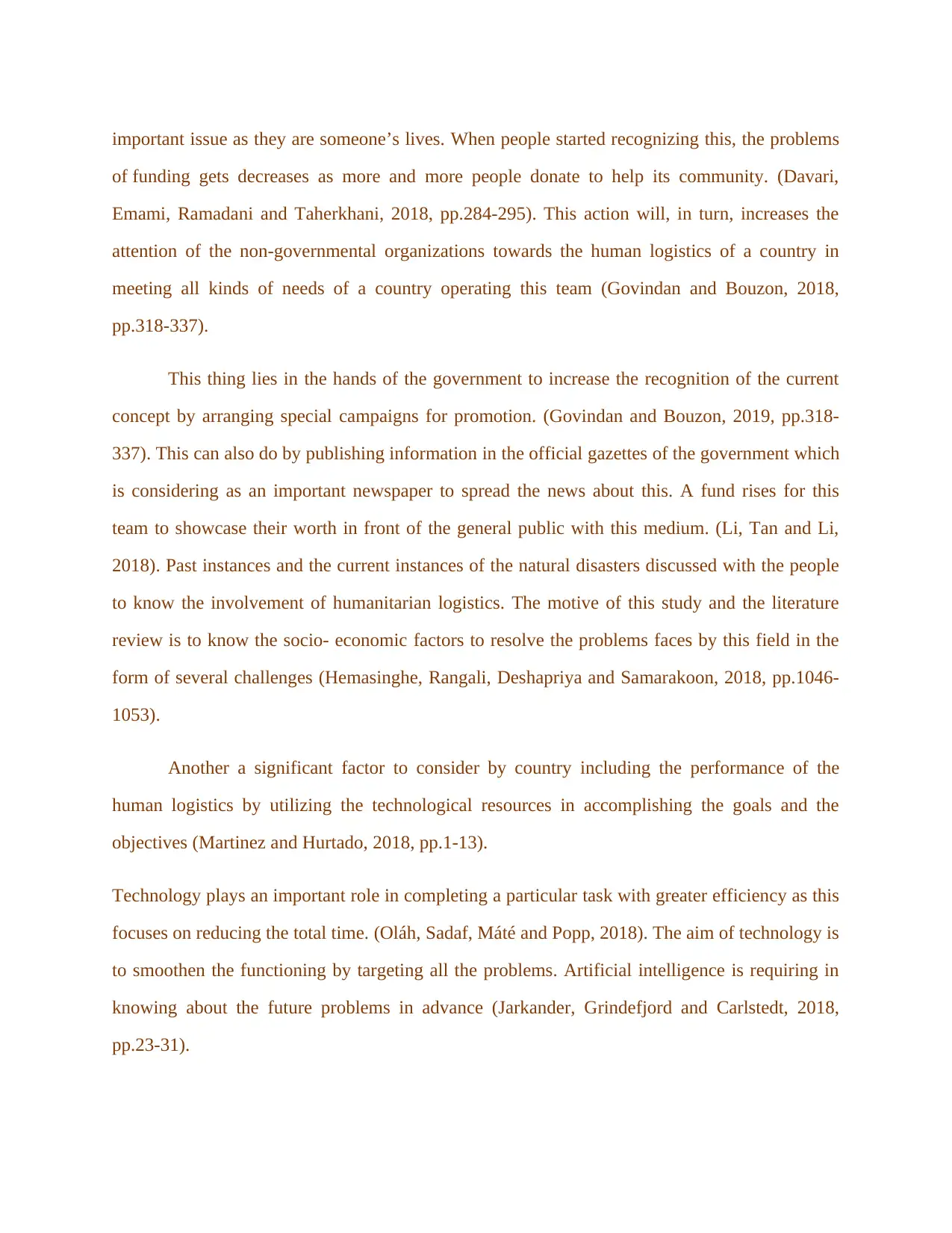
important issue as they are someone’s lives. When people started recognizing this, the problems
of funding gets decreases as more and more people donate to help its community. (Davari,
Emami, Ramadani and Taherkhani, 2018, pp.284-295). This action will, in turn, increases the
attention of the non-governmental organizations towards the human logistics of a country in
meeting all kinds of needs of a country operating this team (Govindan and Bouzon, 2018,
pp.318-337).
This thing lies in the hands of the government to increase the recognition of the current
concept by arranging special campaigns for promotion. (Govindan and Bouzon, 2019, pp.318-
337). This can also do by publishing information in the official gazettes of the government which
is considering as an important newspaper to spread the news about this. A fund rises for this
team to showcase their worth in front of the general public with this medium. (Li, Tan and Li,
2018). Past instances and the current instances of the natural disasters discussed with the people
to know the involvement of humanitarian logistics. The motive of this study and the literature
review is to know the socio- economic factors to resolve the problems faces by this field in the
form of several challenges (Hemasinghe, Rangali, Deshapriya and Samarakoon, 2018, pp.1046-
1053).
Another a significant factor to consider by country including the performance of the
human logistics by utilizing the technological resources in accomplishing the goals and the
objectives (Martinez and Hurtado, 2018, pp.1-13).
Technology plays an important role in completing a particular task with greater efficiency as this
focuses on reducing the total time. (Oláh, Sadaf, Máté and Popp, 2018). The aim of technology is
to smoothen the functioning by targeting all the problems. Artificial intelligence is requiring in
knowing about the future problems in advance (Jarkander, Grindefjord and Carlstedt, 2018,
pp.23-31).
of funding gets decreases as more and more people donate to help its community. (Davari,
Emami, Ramadani and Taherkhani, 2018, pp.284-295). This action will, in turn, increases the
attention of the non-governmental organizations towards the human logistics of a country in
meeting all kinds of needs of a country operating this team (Govindan and Bouzon, 2018,
pp.318-337).
This thing lies in the hands of the government to increase the recognition of the current
concept by arranging special campaigns for promotion. (Govindan and Bouzon, 2019, pp.318-
337). This can also do by publishing information in the official gazettes of the government which
is considering as an important newspaper to spread the news about this. A fund rises for this
team to showcase their worth in front of the general public with this medium. (Li, Tan and Li,
2018). Past instances and the current instances of the natural disasters discussed with the people
to know the involvement of humanitarian logistics. The motive of this study and the literature
review is to know the socio- economic factors to resolve the problems faces by this field in the
form of several challenges (Hemasinghe, Rangali, Deshapriya and Samarakoon, 2018, pp.1046-
1053).
Another a significant factor to consider by country including the performance of the
human logistics by utilizing the technological resources in accomplishing the goals and the
objectives (Martinez and Hurtado, 2018, pp.1-13).
Technology plays an important role in completing a particular task with greater efficiency as this
focuses on reducing the total time. (Oláh, Sadaf, Máté and Popp, 2018). The aim of technology is
to smoothen the functioning by targeting all the problems. Artificial intelligence is requiring in
knowing about the future problems in advance (Jarkander, Grindefjord and Carlstedt, 2018,
pp.23-31).
Paraphrase This Document
Need a fresh take? Get an instant paraphrase of this document with our AI Paraphraser
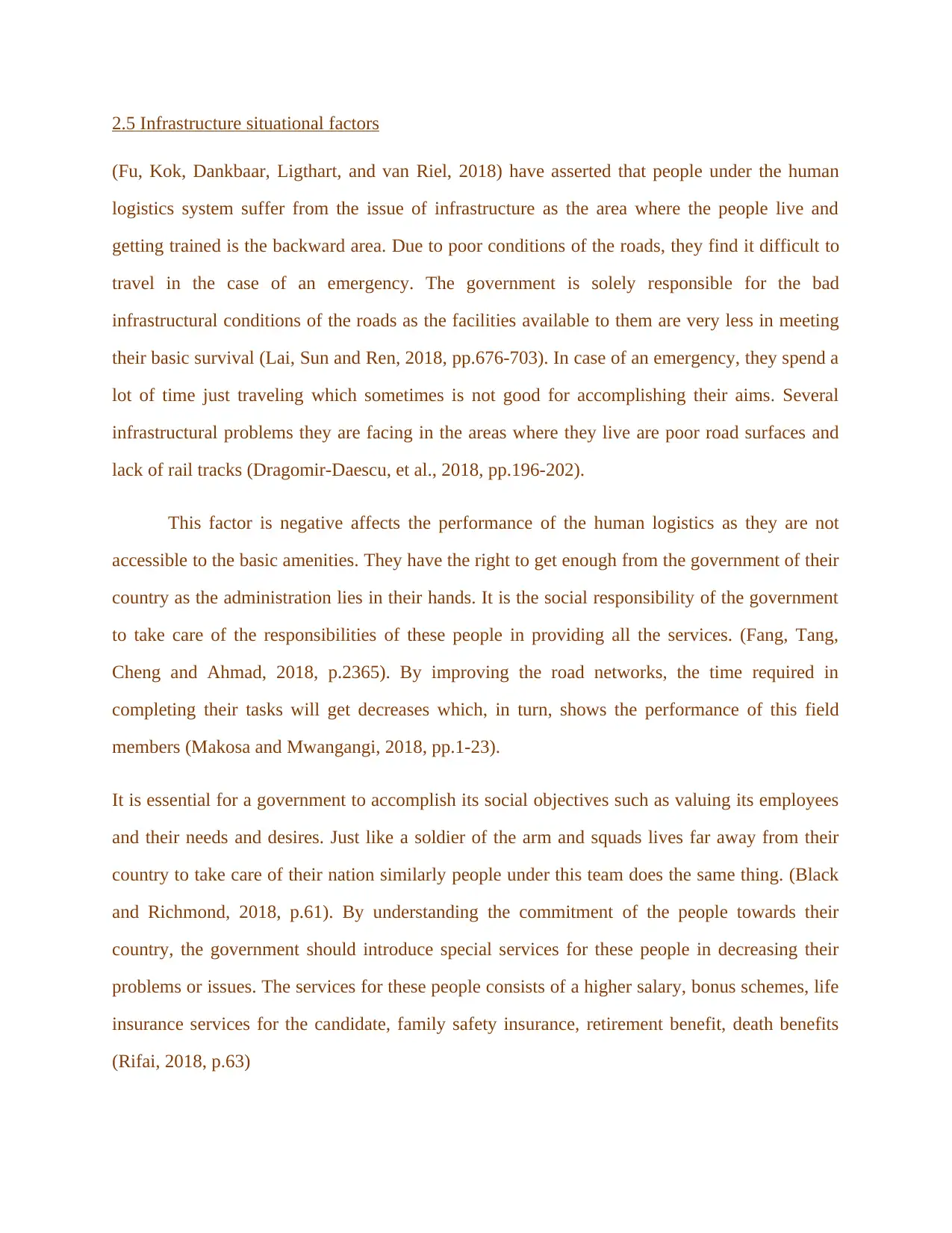
2.5 Infrastructure situational factors
(Fu, Kok, Dankbaar, Ligthart, and van Riel, 2018) have asserted that people under the human
logistics system suffer from the issue of infrastructure as the area where the people live and
getting trained is the backward area. Due to poor conditions of the roads, they find it difficult to
travel in the case of an emergency. The government is solely responsible for the bad
infrastructural conditions of the roads as the facilities available to them are very less in meeting
their basic survival (Lai, Sun and Ren, 2018, pp.676-703). In case of an emergency, they spend a
lot of time just traveling which sometimes is not good for accomplishing their aims. Several
infrastructural problems they are facing in the areas where they live are poor road surfaces and
lack of rail tracks (Dragomir-Daescu, et al., 2018, pp.196-202).
This factor is negative affects the performance of the human logistics as they are not
accessible to the basic amenities. They have the right to get enough from the government of their
country as the administration lies in their hands. It is the social responsibility of the government
to take care of the responsibilities of these people in providing all the services. (Fang, Tang,
Cheng and Ahmad, 2018, p.2365). By improving the road networks, the time required in
completing their tasks will get decreases which, in turn, shows the performance of this field
members (Makosa and Mwangangi, 2018, pp.1-23).
It is essential for a government to accomplish its social objectives such as valuing its employees
and their needs and desires. Just like a soldier of the arm and squads lives far away from their
country to take care of their nation similarly people under this team does the same thing. (Black
and Richmond, 2018, p.61). By understanding the commitment of the people towards their
country, the government should introduce special services for these people in decreasing their
problems or issues. The services for these people consists of a higher salary, bonus schemes, life
insurance services for the candidate, family safety insurance, retirement benefit, death benefits
(Rifai, 2018, p.63)
(Fu, Kok, Dankbaar, Ligthart, and van Riel, 2018) have asserted that people under the human
logistics system suffer from the issue of infrastructure as the area where the people live and
getting trained is the backward area. Due to poor conditions of the roads, they find it difficult to
travel in the case of an emergency. The government is solely responsible for the bad
infrastructural conditions of the roads as the facilities available to them are very less in meeting
their basic survival (Lai, Sun and Ren, 2018, pp.676-703). In case of an emergency, they spend a
lot of time just traveling which sometimes is not good for accomplishing their aims. Several
infrastructural problems they are facing in the areas where they live are poor road surfaces and
lack of rail tracks (Dragomir-Daescu, et al., 2018, pp.196-202).
This factor is negative affects the performance of the human logistics as they are not
accessible to the basic amenities. They have the right to get enough from the government of their
country as the administration lies in their hands. It is the social responsibility of the government
to take care of the responsibilities of these people in providing all the services. (Fang, Tang,
Cheng and Ahmad, 2018, p.2365). By improving the road networks, the time required in
completing their tasks will get decreases which, in turn, shows the performance of this field
members (Makosa and Mwangangi, 2018, pp.1-23).
It is essential for a government to accomplish its social objectives such as valuing its employees
and their needs and desires. Just like a soldier of the arm and squads lives far away from their
country to take care of their nation similarly people under this team does the same thing. (Black
and Richmond, 2018, p.61). By understanding the commitment of the people towards their
country, the government should introduce special services for these people in decreasing their
problems or issues. The services for these people consists of a higher salary, bonus schemes, life
insurance services for the candidate, family safety insurance, retirement benefit, death benefits
(Rifai, 2018, p.63)
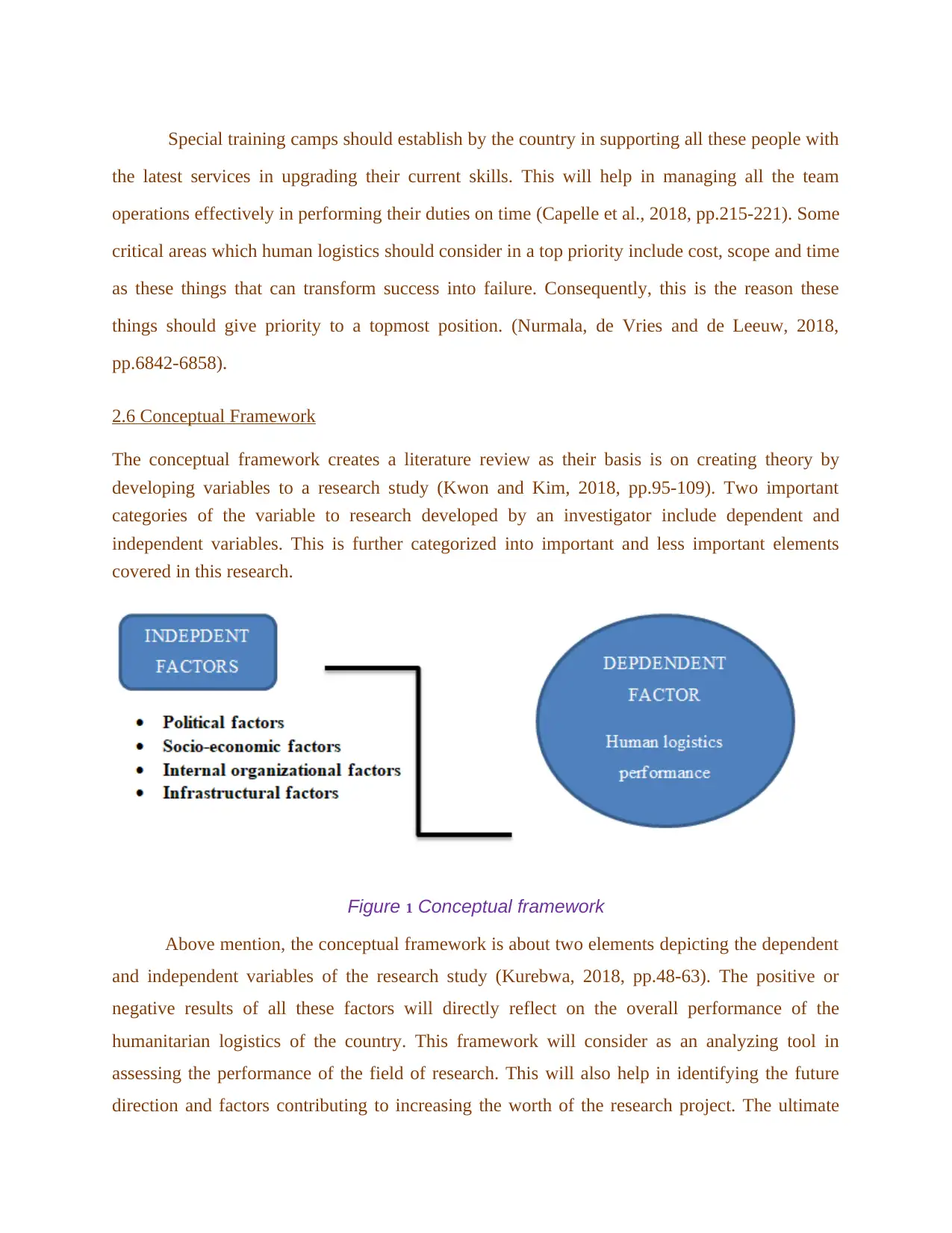
Special training camps should establish by the country in supporting all these people with
the latest services in upgrading their current skills. This will help in managing all the team
operations effectively in performing their duties on time (Capelle et al., 2018, pp.215-221). Some
critical areas which human logistics should consider in a top priority include cost, scope and time
as these things that can transform success into failure. Consequently, this is the reason these
things should give priority to a topmost position. (Nurmala, de Vries and de Leeuw, 2018,
pp.6842-6858).
2.6 Conceptual Framework
The conceptual framework creates a literature review as their basis is on creating theory by
developing variables to a research study (Kwon and Kim, 2018, pp.95-109). Two important
categories of the variable to research developed by an investigator include dependent and
independent variables. This is further categorized into important and less important elements
covered in this research.
Figure 1 Conceptual framework
Above mention, the conceptual framework is about two elements depicting the dependent
and independent variables of the research study (Kurebwa, 2018, pp.48-63). The positive or
negative results of all these factors will directly reflect on the overall performance of the
humanitarian logistics of the country. This framework will consider as an analyzing tool in
assessing the performance of the field of research. This will also help in identifying the future
direction and factors contributing to increasing the worth of the research project. The ultimate
the latest services in upgrading their current skills. This will help in managing all the team
operations effectively in performing their duties on time (Capelle et al., 2018, pp.215-221). Some
critical areas which human logistics should consider in a top priority include cost, scope and time
as these things that can transform success into failure. Consequently, this is the reason these
things should give priority to a topmost position. (Nurmala, de Vries and de Leeuw, 2018,
pp.6842-6858).
2.6 Conceptual Framework
The conceptual framework creates a literature review as their basis is on creating theory by
developing variables to a research study (Kwon and Kim, 2018, pp.95-109). Two important
categories of the variable to research developed by an investigator include dependent and
independent variables. This is further categorized into important and less important elements
covered in this research.
Figure 1 Conceptual framework
Above mention, the conceptual framework is about two elements depicting the dependent
and independent variables of the research study (Kurebwa, 2018, pp.48-63). The positive or
negative results of all these factors will directly reflect on the overall performance of the
humanitarian logistics of the country. This framework will consider as an analyzing tool in
assessing the performance of the field of research. This will also help in identifying the future
direction and factors contributing to increasing the worth of the research project. The ultimate
⊘ This is a preview!⊘
Do you want full access?
Subscribe today to unlock all pages.

Trusted by 1+ million students worldwide
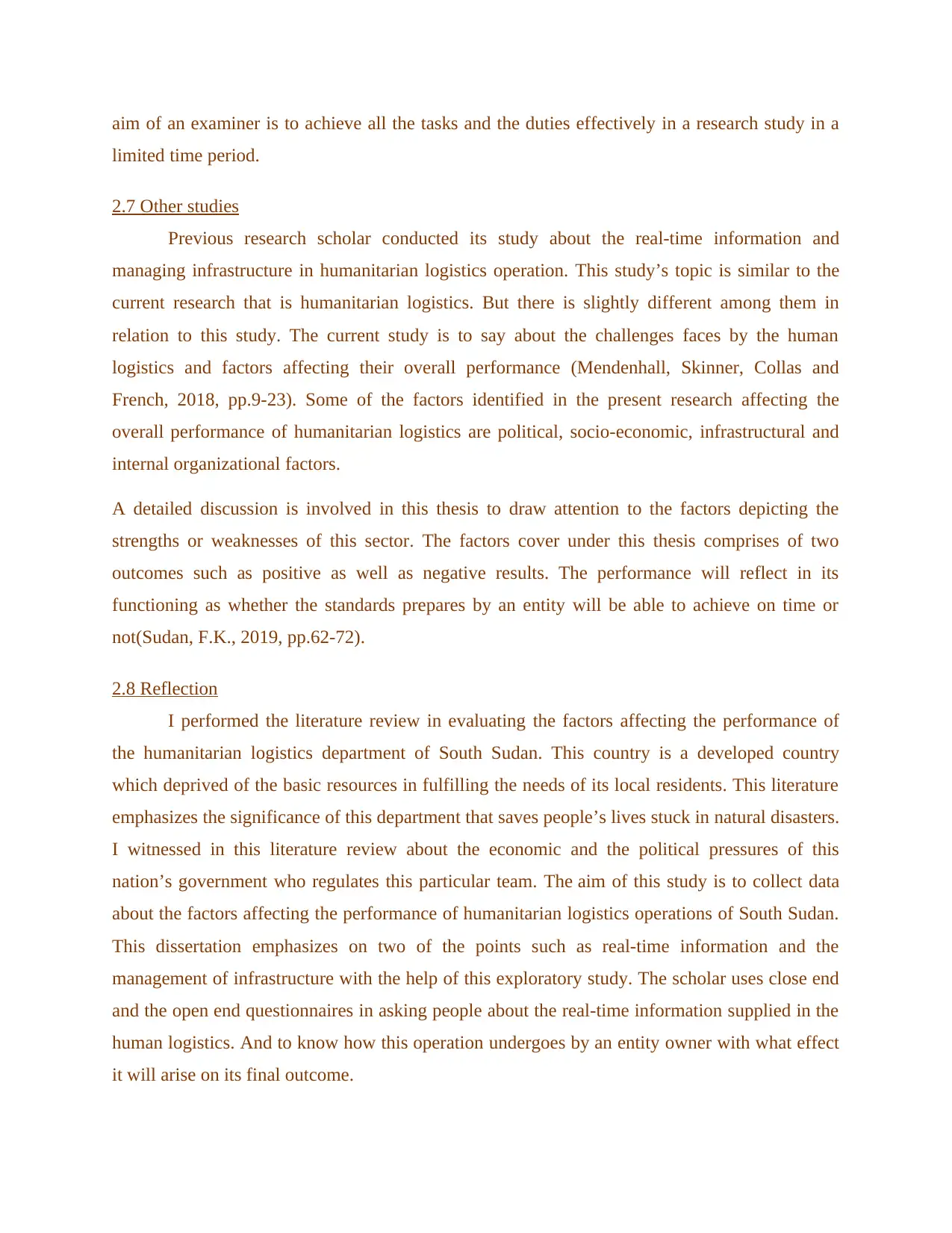
aim of an examiner is to achieve all the tasks and the duties effectively in a research study in a
limited time period.
2.7 Other studies
Previous research scholar conducted its study about the real-time information and
managing infrastructure in humanitarian logistics operation. This study’s topic is similar to the
current research that is humanitarian logistics. But there is slightly different among them in
relation to this study. The current study is to say about the challenges faces by the human
logistics and factors affecting their overall performance (Mendenhall, Skinner, Collas and
French, 2018, pp.9-23). Some of the factors identified in the present research affecting the
overall performance of humanitarian logistics are political, socio-economic, infrastructural and
internal organizational factors.
A detailed discussion is involved in this thesis to draw attention to the factors depicting the
strengths or weaknesses of this sector. The factors cover under this thesis comprises of two
outcomes such as positive as well as negative results. The performance will reflect in its
functioning as whether the standards prepares by an entity will be able to achieve on time or
not(Sudan, F.K., 2019, pp.62-72).
2.8 Reflection
I performed the literature review in evaluating the factors affecting the performance of
the humanitarian logistics department of South Sudan. This country is a developed country
which deprived of the basic resources in fulfilling the needs of its local residents. This literature
emphasizes the significance of this department that saves people’s lives stuck in natural disasters.
I witnessed in this literature review about the economic and the political pressures of this
nation’s government who regulates this particular team. The aim of this study is to collect data
about the factors affecting the performance of humanitarian logistics operations of South Sudan.
This dissertation emphasizes on two of the points such as real-time information and the
management of infrastructure with the help of this exploratory study. The scholar uses close end
and the open end questionnaires in asking people about the real-time information supplied in the
human logistics. And to know how this operation undergoes by an entity owner with what effect
it will arise on its final outcome.
limited time period.
2.7 Other studies
Previous research scholar conducted its study about the real-time information and
managing infrastructure in humanitarian logistics operation. This study’s topic is similar to the
current research that is humanitarian logistics. But there is slightly different among them in
relation to this study. The current study is to say about the challenges faces by the human
logistics and factors affecting their overall performance (Mendenhall, Skinner, Collas and
French, 2018, pp.9-23). Some of the factors identified in the present research affecting the
overall performance of humanitarian logistics are political, socio-economic, infrastructural and
internal organizational factors.
A detailed discussion is involved in this thesis to draw attention to the factors depicting the
strengths or weaknesses of this sector. The factors cover under this thesis comprises of two
outcomes such as positive as well as negative results. The performance will reflect in its
functioning as whether the standards prepares by an entity will be able to achieve on time or
not(Sudan, F.K., 2019, pp.62-72).
2.8 Reflection
I performed the literature review in evaluating the factors affecting the performance of
the humanitarian logistics department of South Sudan. This country is a developed country
which deprived of the basic resources in fulfilling the needs of its local residents. This literature
emphasizes the significance of this department that saves people’s lives stuck in natural disasters.
I witnessed in this literature review about the economic and the political pressures of this
nation’s government who regulates this particular team. The aim of this study is to collect data
about the factors affecting the performance of humanitarian logistics operations of South Sudan.
This dissertation emphasizes on two of the points such as real-time information and the
management of infrastructure with the help of this exploratory study. The scholar uses close end
and the open end questionnaires in asking people about the real-time information supplied in the
human logistics. And to know how this operation undergoes by an entity owner with what effect
it will arise on its final outcome.
Paraphrase This Document
Need a fresh take? Get an instant paraphrase of this document with our AI Paraphraser
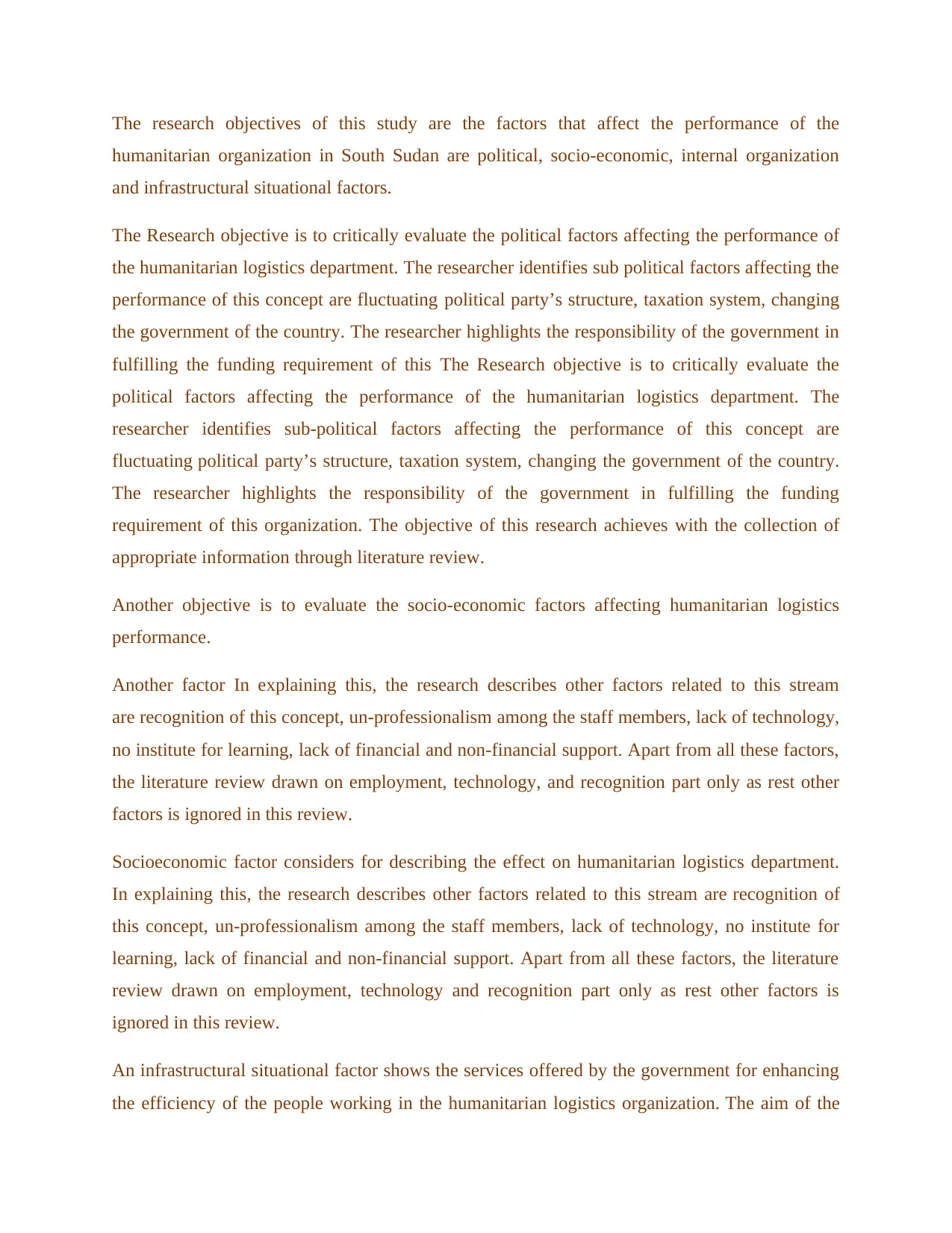
The research objectives of this study are the factors that affect the performance of the
humanitarian organization in South Sudan are political, socio-economic, internal organization
and infrastructural situational factors.
The Research objective is to critically evaluate the political factors affecting the performance of
the humanitarian logistics department. The researcher identifies sub political factors affecting the
performance of this concept are fluctuating political party’s structure, taxation system, changing
the government of the country. The researcher highlights the responsibility of the government in
fulfilling the funding requirement of this The Research objective is to critically evaluate the
political factors affecting the performance of the humanitarian logistics department. The
researcher identifies sub-political factors affecting the performance of this concept are
fluctuating political party’s structure, taxation system, changing the government of the country.
The researcher highlights the responsibility of the government in fulfilling the funding
requirement of this organization. The objective of this research achieves with the collection of
appropriate information through literature review.
Another objective is to evaluate the socio-economic factors affecting humanitarian logistics
performance.
Another factor In explaining this, the research describes other factors related to this stream
are recognition of this concept, un-professionalism among the staff members, lack of technology,
no institute for learning, lack of financial and non-financial support. Apart from all these factors,
the literature review drawn on employment, technology, and recognition part only as rest other
factors is ignored in this review.
Socioeconomic factor considers for describing the effect on humanitarian logistics department.
In explaining this, the research describes other factors related to this stream are recognition of
this concept, un-professionalism among the staff members, lack of technology, no institute for
learning, lack of financial and non-financial support. Apart from all these factors, the literature
review drawn on employment, technology and recognition part only as rest other factors is
ignored in this review.
An infrastructural situational factor shows the services offered by the government for enhancing
the efficiency of the people working in the humanitarian logistics organization. The aim of the
humanitarian organization in South Sudan are political, socio-economic, internal organization
and infrastructural situational factors.
The Research objective is to critically evaluate the political factors affecting the performance of
the humanitarian logistics department. The researcher identifies sub political factors affecting the
performance of this concept are fluctuating political party’s structure, taxation system, changing
the government of the country. The researcher highlights the responsibility of the government in
fulfilling the funding requirement of this The Research objective is to critically evaluate the
political factors affecting the performance of the humanitarian logistics department. The
researcher identifies sub-political factors affecting the performance of this concept are
fluctuating political party’s structure, taxation system, changing the government of the country.
The researcher highlights the responsibility of the government in fulfilling the funding
requirement of this organization. The objective of this research achieves with the collection of
appropriate information through literature review.
Another objective is to evaluate the socio-economic factors affecting humanitarian logistics
performance.
Another factor In explaining this, the research describes other factors related to this stream
are recognition of this concept, un-professionalism among the staff members, lack of technology,
no institute for learning, lack of financial and non-financial support. Apart from all these factors,
the literature review drawn on employment, technology, and recognition part only as rest other
factors is ignored in this review.
Socioeconomic factor considers for describing the effect on humanitarian logistics department.
In explaining this, the research describes other factors related to this stream are recognition of
this concept, un-professionalism among the staff members, lack of technology, no institute for
learning, lack of financial and non-financial support. Apart from all these factors, the literature
review drawn on employment, technology and recognition part only as rest other factors is
ignored in this review.
An infrastructural situational factor shows the services offered by the government for enhancing
the efficiency of the people working in the humanitarian logistics organization. The aim of the
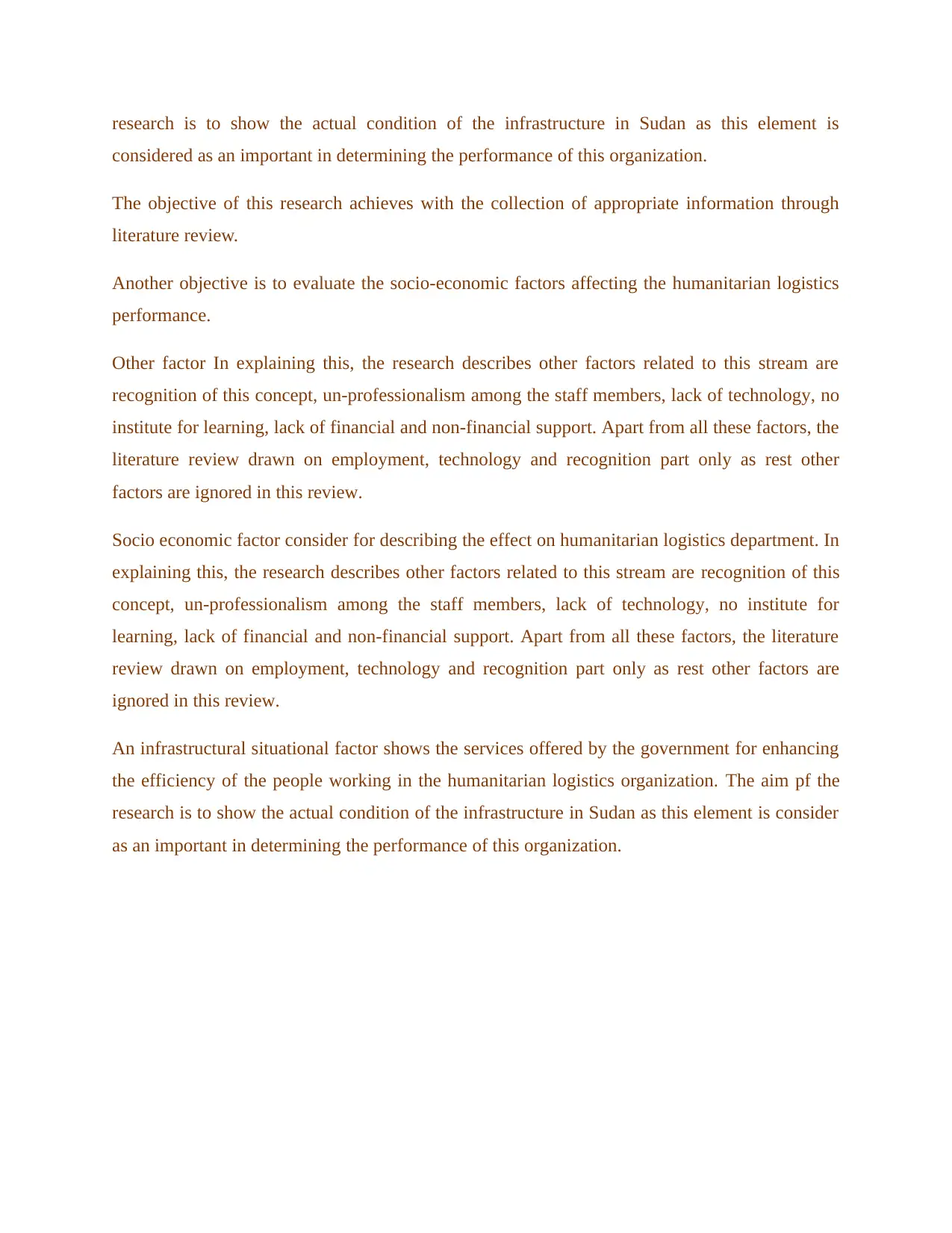
research is to show the actual condition of the infrastructure in Sudan as this element is
considered as an important in determining the performance of this organization.
The objective of this research achieves with the collection of appropriate information through
literature review.
Another objective is to evaluate the socio-economic factors affecting the humanitarian logistics
performance.
Other factor In explaining this, the research describes other factors related to this stream are
recognition of this concept, un-professionalism among the staff members, lack of technology, no
institute for learning, lack of financial and non-financial support. Apart from all these factors, the
literature review drawn on employment, technology and recognition part only as rest other
factors are ignored in this review.
Socio economic factor consider for describing the effect on humanitarian logistics department. In
explaining this, the research describes other factors related to this stream are recognition of this
concept, un-professionalism among the staff members, lack of technology, no institute for
learning, lack of financial and non-financial support. Apart from all these factors, the literature
review drawn on employment, technology and recognition part only as rest other factors are
ignored in this review.
An infrastructural situational factor shows the services offered by the government for enhancing
the efficiency of the people working in the humanitarian logistics organization. The aim pf the
research is to show the actual condition of the infrastructure in Sudan as this element is consider
as an important in determining the performance of this organization.
considered as an important in determining the performance of this organization.
The objective of this research achieves with the collection of appropriate information through
literature review.
Another objective is to evaluate the socio-economic factors affecting the humanitarian logistics
performance.
Other factor In explaining this, the research describes other factors related to this stream are
recognition of this concept, un-professionalism among the staff members, lack of technology, no
institute for learning, lack of financial and non-financial support. Apart from all these factors, the
literature review drawn on employment, technology and recognition part only as rest other
factors are ignored in this review.
Socio economic factor consider for describing the effect on humanitarian logistics department. In
explaining this, the research describes other factors related to this stream are recognition of this
concept, un-professionalism among the staff members, lack of technology, no institute for
learning, lack of financial and non-financial support. Apart from all these factors, the literature
review drawn on employment, technology and recognition part only as rest other factors are
ignored in this review.
An infrastructural situational factor shows the services offered by the government for enhancing
the efficiency of the people working in the humanitarian logistics organization. The aim pf the
research is to show the actual condition of the infrastructure in Sudan as this element is consider
as an important in determining the performance of this organization.
⊘ This is a preview!⊘
Do you want full access?
Subscribe today to unlock all pages.

Trusted by 1+ million students worldwide
1 out of 12
Related Documents
Your All-in-One AI-Powered Toolkit for Academic Success.
+13062052269
info@desklib.com
Available 24*7 on WhatsApp / Email
![[object Object]](/_next/static/media/star-bottom.7253800d.svg)
Unlock your academic potential
Copyright © 2020–2026 A2Z Services. All Rights Reserved. Developed and managed by ZUCOL.





